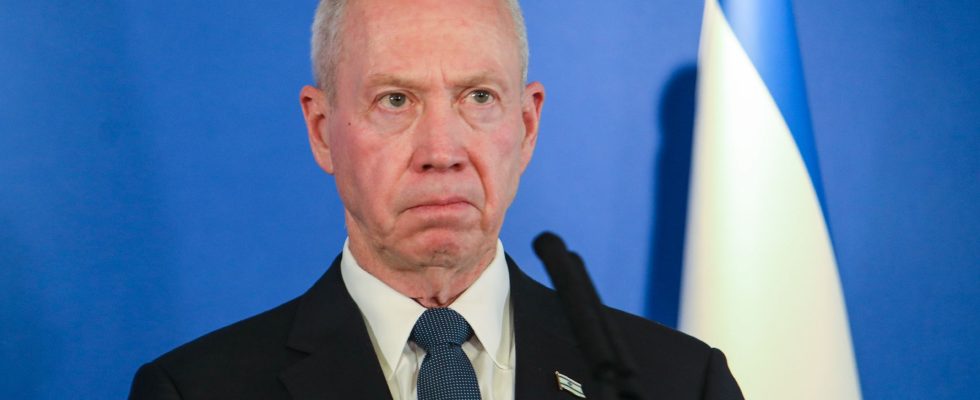Three months after the start of the war between Israel and Hamas, the government of Benyamin Netanyahu outlines a first political plan for the “post-war” in the Palestinian enclave. On Thursday January 4 evening, Israeli Defense Minister Yoav Gallant rejected the hypothesis of “an Israeli civilian presence in the Gaza Strip, after the war objectives have been achieved”, according to several local media.
“The inhabitants of Gaza are Palestinian, therefore, Palestinian entities will be responsible for the management” of the territory, continued the Minister of Defense, “provided that there is no hostile action or threat against Israel”, specifying that the IDF would maintain “its freedom of action” in Gaza on a military level, to curb any possible “threat” there.
Israeli government divided
The members of the war cabinet met officially for the first time Thursday evening since October 7 around this burning question: what will happen to the political management of the territory of 365 square kilometers? A first consultation had in fact been canceled, recalls the Israeli daily Haaretzdue to divisions within the government and the controversies sparked by the comments of its most radical members.
At the beginning of the week, the Minister of National Security Itamar Ben-Gvir, and that of Finance, Bezalel Smotrich, among the most extremists in the Netanyahu government, had called for “encouraging” the Palestinian population to emigrate, and for a return of the settlers Jews in Gaza (left in 2005, after the Israeli withdrawal from the Palestinian enclave). Statements described as “inflammatory and irresponsible” by the American State Department, which indicated that “the government, including the Prime Minister, Benjamin Netanyahu, had affirmed that these remarks did not reflect the position of the Israeli authorities” .
International force
The Minister of Defense thus brushed aside the plan to occupy the Gaza Strip after the war, and clarified Israel’s political objectives, which have been the subject of a multitude of analyzes since the start of the invasion earthly. The proposed plan could thus be based on four parts: the first, an international force (made up of the United States, the European Union, and moderate Arab countries), which would be responsible for “reconstructing the Gaza Strip, and serving relay to international agencies wishing to provide aid”, explains Haaretz.
The second, a Palestinian political apparatus, cleansed of Hamas, and which would consist of local governorates not hostile to Israel. Egypt should also play a role, by contributing to “effectively securing the border with Gaza”, while Israel wishes to close its crossing points towards the enclave, indicates the Jerusalem Post. Finally, Israel should itself provide the information that will guide the operations of the international force, and control the entry of goods into the Gaza Strip.
Doubt about the composition of the “Palestinian administration”
The discussions between members of the Israeli war cabinet are being held in parallel with a new diplomatic tour by US Secretary of State Antony Blinken in the Middle East, to try to avoid a regional escalation. The United States has repeatedly shown itself to be in favor of a two-state solution, with the support of the Palestinian Authority (PA), currently in power in the West Bank, but ousted from Gaza in 2007 for the benefit of Hamas.
Problem is, its leaders are particularly criticized and struggle to find legitimacy in the territory. According to a recent poll by the Palestinian Policy and Polling Research Center (PCPSR), an independent institute in Ramallah, 11% of respondents predict a PA government in Gaza, including only 7% with its current leader Mahmoud Abbas. As for two thirds of Palestinians (64%), they believe that it is Hamas which will retain control of Gaza at the end of the fighting, according to AFP.
Distant perspective
The solution proposed by the United States does not suit the Israeli government either: Benjamin Netanyahu is pleading for a new, completely reformed Palestinian administration. “Yoav Gallant is convinced that it is possible to find or form” political groups not influenced by Hamas in the strip, and favorable to Israel, assures the Jerusalem Post.
For his part, the Prime Minister of the Palestinian Authority, Mohammed Shtayyeh, called in Financial Times to find a “political solution for the whole of Palestine” and not just Gaza. However, “the question of the post-war period does not arise clearly”, and will depend on when and how Israel leaves Gaza, “probably not in 2024”, he lamented. The Israeli Defense Minister reaffirmed Thursday evening that the operations would continue for many months, until the “return of the hostages”, the “dismantling of Hamas’ military and governance capabilities” and the “elimination of military threats”. .
